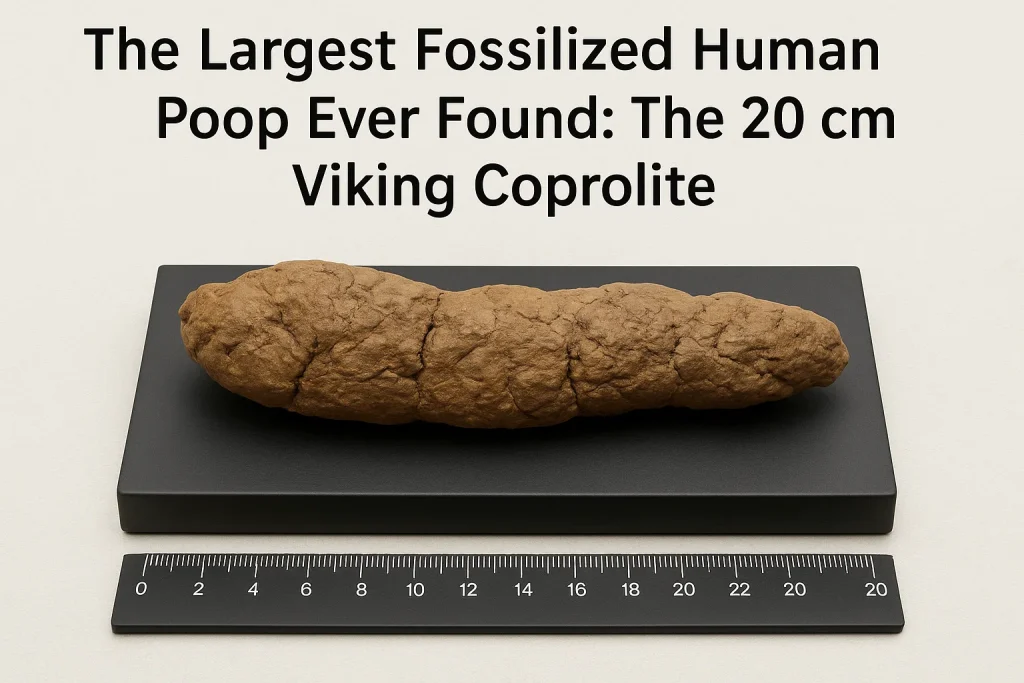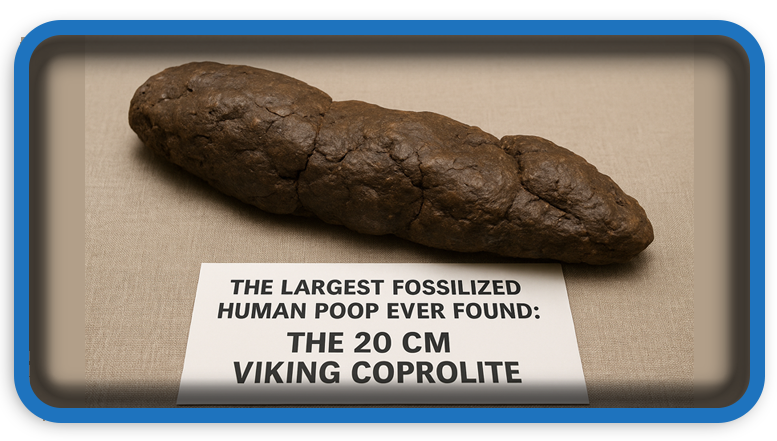⏲️ Estimated reading time: 4 min
🧠 The discovery of a 20 cm fossilized Viking poop in York shocked archaeologists and provided valuable insights into the diet and health of 9th-century Norsemen. Learn the unusual story of the “Lloyds Bank coprolite.”
💩 Shocking Discovery: The Largest Fossilized Human Excrement in History Belongs to a Viking!
In archaeology, not every discovery shines like gold or reveals secrets through ancient inscriptions. Sometimes, the most fascinating clues about past lives come in unexpected forms like a piece of poop. And not just any poop, but a perfectly fossilized Viking turd, 20 cm long. This biological relic has amazed experts and the public alike, becoming one of the most bizarre and valuable finds in modern archaeological history.
📍 Where and When Was It Found?
It all began in 1972, in York, England. Archaeologists were excavating a historic site under what would later become a Lloyds Bank branch. Among typical medieval artifacts, they uncovered a long, brown, surprisingly intact object a fossilized human excrement, now famously known as the “Lloyds Bank coprolite.”
🕰️ How Old Is It?
Stratigraphic analyses showed the coprolite dates back to the 9th century. At that time, York was known as Jorvik, a major Viking colony. Thus, the “author” of the poop was most likely a Norseman living and eating in this bustling trade city.
🧬 What Can This Poop Tell Us About Vikings?
It might seem funny or even gross to study fossilized feces, but they provide a remarkably clear window into the past. By analyzing organic content, researchers can reconstruct a person’s diet, health, and daily habits.
🍖 The Viking’s Typical Diet
The coprolite revealed clear traces of:
- Processed or dried meat;
- Grains and bread remnants;
- Very little plant fiber, suggesting a low intake of vegetables.
This high-protein diet was typical of a warrior population that needed constant energy.
Intestinal Parasites Found
A concerning discovery was the large quantity of intestinal parasite eggs. Researchers identified:
- Whipworms (Trichuris trichiura);
- Roundworms (Ascaris lumbricoides).
These parasites indicate poor hygiene and a lack of proper sanitation common in that era.
🧪 How Did This Poop Survive So Well?
The secret lies in York’s soil composition, rich in clay and low in oxygen. This anaerobic environment prevented full decomposition, allowing the Viking coprolite to be preserved perfectly over centuries.

🏛️ Where Is It Now?
The fossil is now on display at the Jorvik Viking Centre in York. It has quickly become one of the museum’s most visited pieces and often appears in international rankings of the world’s weirdest archaeological discoveries.
🎤 What Do Experts Say?
Professor Andrew Jones, an archaeologist, once said:
“This is, without doubt, the most valuable piece of crap we own.”
Amusing as it sounds, this quote underlines the unusual scientific value of the find.
🤔 What Can We Learn from a Fossilized Poop?
Even a simple poop can offer:
- Evidence of dietary habits;
- Insights into living conditions;
- Details about health and hygiene in ancient communities.
It’s a lesson in how every aspect of human life even the intimate or embarrassing ones can hold major historical importance.
🔍 Life Lesson from a Fossilized Poop
Ironically, a chunk of ancient human waste over 1,000 years old can carry tremendous educational, scientific, and cultural value. It’s a reminder that history isn’t just written in swords, scrolls, or royal jewels but also in seemingly trivial details.
🔔 For more tutorials like this, consider subscribing to our blog.
📩 Do you have questions or suggestions? Leave a comment or contact us!
🏷️ Tags: archaeology, vikings, fossils, coprolite, York, human excrement, historical discoveries, medieval health, Jorvik, weird museums
📢 Hashtags: #archaeology, #vikings, #historicaldiscoveries, #coprolite, #York, #VikingMuseum, #strangehistory, #fossilizedfeces, #JorvikCentre, #vikinglifestyle
🔍 Historical Reflection
History isn’t just about kings and wars. It’s also about daily habits, regular people, and their real lives. The Viking poop from York reminds us that even the strangest artifacts can play an essential role in understanding our past. Want more fascinating and unexpected stories like this one? Stay with us history is full of surprises.
Only logged-in users can submit reports.
Discover more from HelpZone
Subscribe to get the latest posts sent to your email.

